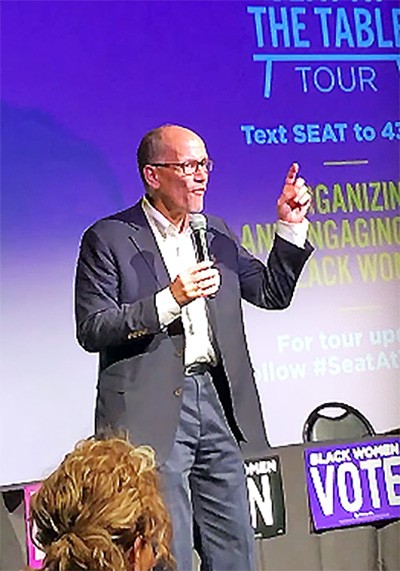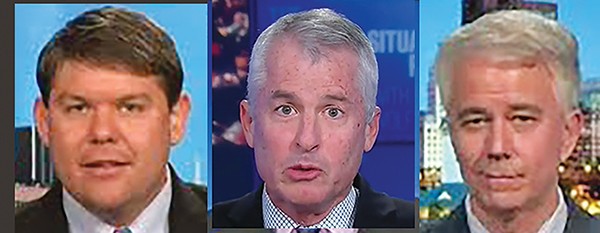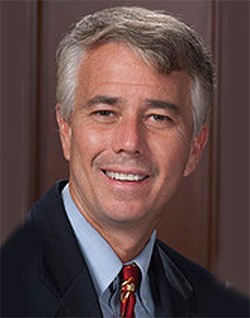In the month and a half that the current version of the Shelby County Commission — the one in office as of the August 2nd county general election — has been meeting, it has become clear that serious division of opinion exists on the body, more or less along party lines.
But, so far, no open antagonism has manifested itself. That fact would distinguish this commission from its two immediate predecessors — the commission of 2010-2014, which saw animosities flare between members, and the one of 2014-2018, which saw open warfare between a bipartisan contingent on the commission and the county mayor’s office.
Two key votes at the commission’s Monday meeting indicated the divides of this commission. One vote was to approve a vote of no confidence in the recent decision by the U.S. Department of Justice to terminate a Memorandum of Agreement with Shelby County providing continued DOJ oversight of problems with Juvenile Court.
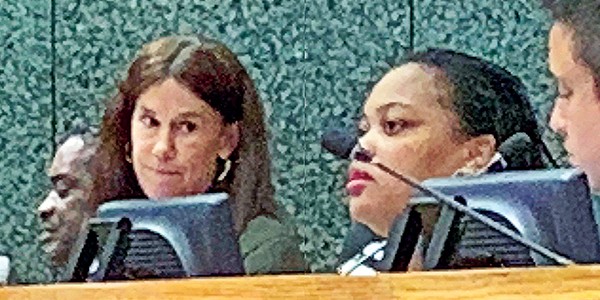 Jackson Baker
Jackson Baker
As Democrat Tami Sawyer (right) speaks to a no-confidence resolution on end of DOJ oversight of Juvenile Court, Republican Brandon Morrison looks on disapprovingly.
Both a commission majority and County Mayor Lee Harris have publicly disapproved of the decision to end oversight, and on Monday the vote on the no-confidence resolution, co-sponsored by Commissioner Tami Sawyer and Commission Chair Van Turner, both Democrats, passed by a 7-4-1 vote, with the four opponents being four of the commission’s five Republicans — Brandon Morrison, Amber Mills, David Bradford, and Mark Billingsley — while the fifth GOP member, Mick Wright, abstained.
A second resolution, this one co-sponsored by Sawyer and Edmund Ford Jr., requested that the Memorandum of Understanding between four major law-enforcement branches — the Shelby County Sheriff’s Office, the Memphis Police Department, the Tennessee Bureau of Investigation, and the Shelby County District Attorney General — be amended “to include TBI’s investigation of critical injuries” resulting from law enforcement shootings.
The resolution’s essential point was to enlarge TBI oversight of such incidents. The vote was similar, another 7-4-1 vote, with Wright joining the dissenters this time and Bradford abstaining.
This basic divide, along party lines, is likely to continue, especially on issues of social significance.
• Tom Perez, the chairman of the Democratic National Committee, made a stop in Memphis on Saturday at the National Civil Rights Museum for an installment of the DNC’s “Seat at the Table” tour, designed to galvanize the involvement of African-American women in the party.
In his farewell message to attendees, Perez took note of one of the major issues on the November 6th ballot — the referendum for Memphis voters on repeal of Ranked Choice Voting, a method for determining winners, sans runoffs, in multi-candidate races in which no candidate has a majority.
“I’ve spent a lot of time on that issue,” said Perez, after giving a hat-tip to Steve Mulroy, the University of Memphis law professor and former county commissioner who has been a major proponent of RCV (aka Instant Runoff Voting), scheduled to be employed in the 2019 city election, unless repealed.
Perez suggested that “the Republicans” were “trying to take it away,” though in fact it was incumbents of the nonpartisan Memphis City Council who implanted the repeal referendum on the ballot.
“If I were living here, I’d vote no on that referendum, because you’ve already voted for it,” said Perez, who referred to a previous referendum, in 2008, when Memphis voters approved the process by a 70 percent majority. “It forces candidates to talk to everyone, instead of just that one base. It fosters civility because you can’t ignore 70 percent of the people.”
Perez went on: “Talk to them! What a radical concept. That’s why y’all voted for it, and that’s why they don’t want it.”
• Three weeks after Mike Stewart of Nashville, the Democrats’ caucus chairman in the Tennessee House of Representatives, came to Memphis to investigate Republican House candidate Scott McCormick, Stewart returned to reveal his findings.
What he’d been looking for was the absentee record from Shelby County Schools board meetings of McCormick, who is trying to unseat Democrat Dwayne Thompson, the upset winner in 2016 of the District 96 House seat.
Back on October 10th, Stewart and fellow Democrat Marjorie Pomeroy-Wallace spent an afternoon in the county Board of Education building waiting in vain for McCormick’s attendance records.
That was then. On Monday, Stewart and Wallace were back in front of the Board of Education building — but this time with a large standing chart showing, line by line, the apparent actual record of McCormick’s attendance on the board committees he has belonged to.
The chart purported to show that McCormick had missed “at least 72 of 94 committee meetings,” which translates into an absentee rate of 76 percent. “It is a record of chronic absenteeism,” said Stewart. “He consistently missed critical meetings on critical subjects.” Stewart gave as an example the issue of academic performance, which has been the focus of much concern in regard to Shelby County Schools.
“Of 25 meetings on academic performance, Scott McCormick attended just five. What can we expect when he gets into the legislature and nobody’s watching? He was AWOL and obviously should not be promoted to a new assignment. What are you going to do in Nashville when nobody’s supervising you?”
Stewart said the SCS office had not furnished him with written attendance records, but only with recordings, from which he and others had determined McCormick’s attendance record from listening to roll calls. “We had to listen laboriously to every one of them,” he said.
Asked for a reaction, McCormick said Stewart’s figures were misleading. “First of all, committee meetings on the school board aren’t like those in the legislature, which conform to a fixed, predictable schedule.” The School Board meetings were arranged around members’ convenience and availability according to ad hoc questionnaires, he said.
Moreover, said McCormick, “no action is taken at the committee meetings, nothing is voted on,” and any material developed in them is made available to board members in the monthly work sessions that precede by a week the board’s public business sessions. McCormick claimed an attendance rate of 22 out of 23 public business meetings at which votes were taken. And, he said, his attendance record at the evaluations committee, which he heads, was 100 percent.
McCormick said, in effect, that the focus on his attendance record was a red herring and that the main issue of the House race should be the matter of who best could benefit Shelby County in pushing for advances in education and economic development. He said that, as a member of the legislature’s majority party, he was better poised than Thompson to be effective in those regards.
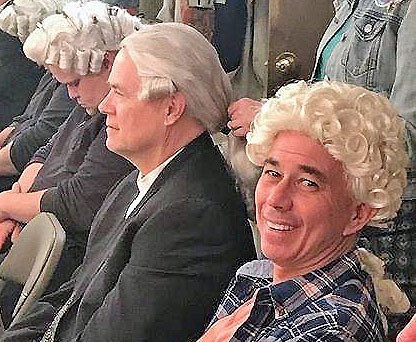

 Jackson Baker
Jackson Baker 